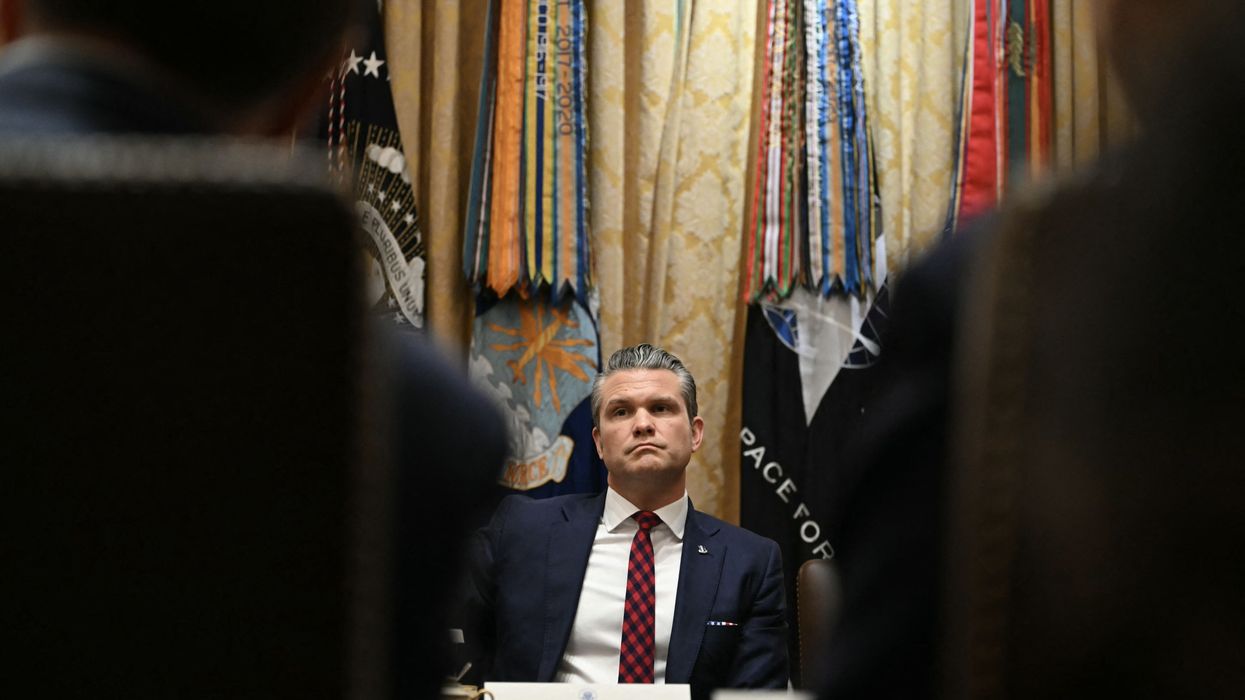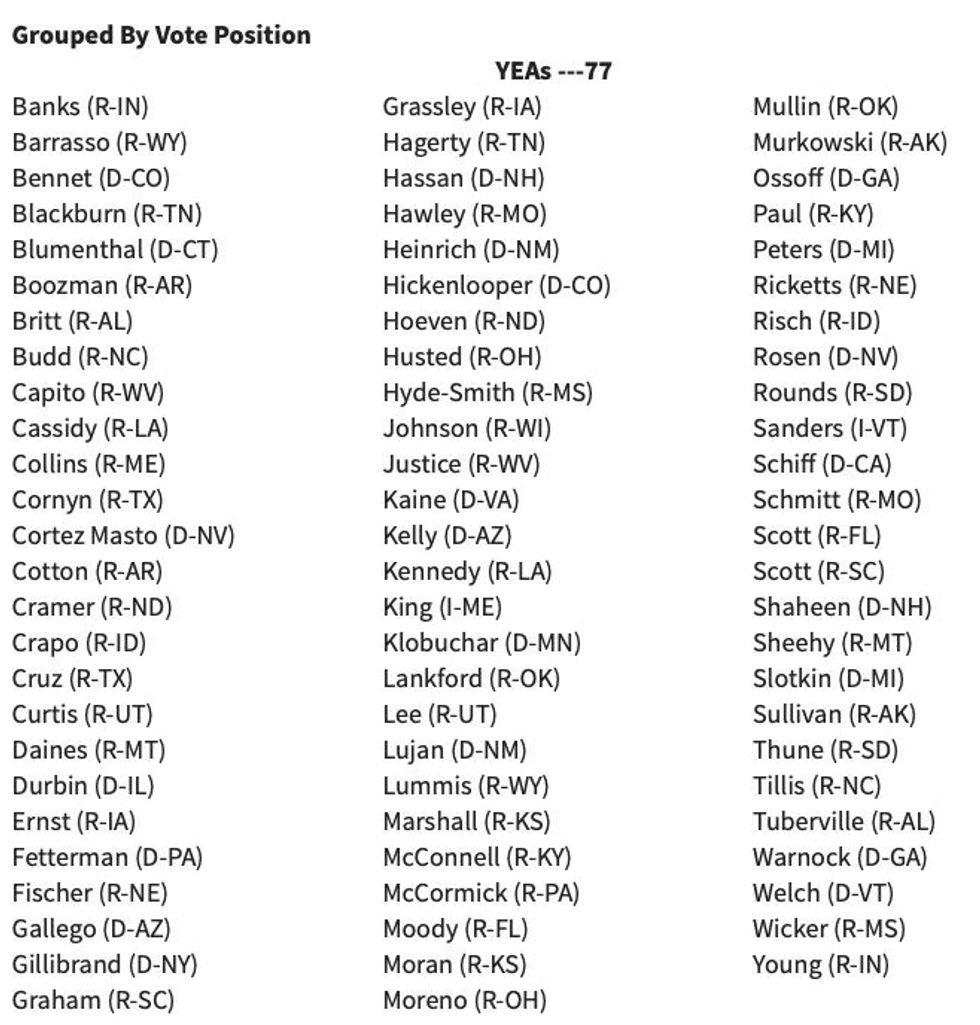"He gave direct, unlawful orders to kill every single person on a civilian boat from Venezuela, violating the Defense Department’s Law of War Manual,” Thanedar said.
He also introduced an article for Hegseth's "mishandling of classified information, leaking war plans in a Signal chat which included sensitive operations details, including target systems and attack times," which "has put American lives at risk," referring to war plans about an airstrike in Yemen that were accidentally spilled to Atlantic editor-in-chief Jeffrey Goldberg earlier this year.
Investigations have been opened in both the House and Senate over the past week regarding the events of September 2, when 11 people were killed in a pair of airstrikes that would become the first of nearly two dozen so far.
The administration alleges that these attacks have been against "narcoterrorists" bringing drugs to the US, who are therefore lawful combatants, but has offered scant evidence. In total, at least 83 people have been killed across nearly two dozen strikes since September.
While the entire boat bombing campaign is almost certainly illegal regardless, the "double-tap" aspect of the September 2 bombing has drawn attention, as attacking those no longer in the fight is blatantly illegal under both international and US law.
The firestorm was ignited after the Washington Post and CNN both reported late last week that Hegseth had given direct orders to "kill them all" as survivors of the first bombing clung to life amid the boat's wreckage. Hegseth has denied these reports, but his account of events has shifted violently. After claiming at the time he watched the operation "live," he now says he was not in the room during the second bombing.
After initially denying that a second bombing took place at all, the White House has since shifted blame onto Adm. Frank "Mitch" Bradley, who testified to the Senate Intelligence Committee on Thursday that Hegseth had not ordered the killing directly, according to Sen. Tom Cotton (R-Ark.), a staunch supporter of the bombing campaign.
The New York Times reported Wednesday that the second bombing was part of a “contingency plan” authorized by Hegseth, who approved the killing of survivors if they appeared to be radioing for help from other alleged cartel members, which would mean they still could theoretically pose a threat.
This was the defense Bradley used on Capitol Hill Thursday, a rationale that one source with direct knowledge of the briefing told CNN was “fucking insane."
Members of Congress were also shown a video of the attack, which House Intelligence Chairman, Rep. Jim Himes (D-Conn.) said was “one of the most troubling things” he'd ever seen. Cotton, meanwhile, said there was no evidence in the footage that a radio had even been used, further undercutting the White House’s rationale.
Despite the increasing number of Democrats who've accused Hegseth of authorizing a "war crime," House Minority Leader Hakeem Jeffries (D-NY) has neglected to push the issue of impeachment, saying earlier this week that it's almost impossible that articles would reach the House floor with a Republican majority.
"Republicans will never allow articles of impeachment to be brought to the floor of the House of Representatives, and we know that's the case," he said. "Donald Trump will order them not to do it."
But just five Republicans would need to join Democrats in order to force an impeachment vote to the floor, and some are reportedly dissatisfied with the White House's answers.
Sen. Mike Turner (R-Ohio), a member of the House Armed Services Committee, which recently launched an investigation into the strikes, said on Thursday that "members are very concerned" about the accuracy of the information being shared with Congress. Turner previously said that if Hegseth indeed ordered the execution of survivors, "that would be very serious, and I agree that that would be an illegal act.”
Even if Hegseth were impeached, his removal from office would be an even greater uphill battle in the Senate, where 20 Republicans would need to join every Democrat and vote to convict him.
But there has also been some sharp criticism from Republicans there. Some has come from longtime critics of the boat bombing campaign, like Sen. Rand Paul (Ky.). The libertarian senator said on Friday that Hegseth himself should be put under oath.
“I think if the public sees images of people clinging to boat debris and being blown up, I think that there is a chance that, finally, the public will get interested enough in this to stop this," Paul said. "And I think that Congress, if they had any kind of gumption at all, would not be allowing this administration to summarily execute people that are suspected of a crime.”
Earlier this week, Paul questioned Hegseth's ever-changing version of events: "Secretary Hegseth said he had no knowledge of this, and it did not happen. It was fake news. It didn’t happen. And then the next day, from the podium of the White House, they’re saying it did happen. Either he was lying to us on Sunday, or he’s incompetent.”
As The Hill reported on Friday, several other GOP senators, including those who usually defend Trump, have also expressed a queasiness about the strikes.
Sen. Jim Justice (R-WV) said he is “not comfortable with the two blow” and called a missile attack on “defenseless survivors” in the water “unacceptable.” If the reports are accurate, he said, “someone needs to get out of Washington.”
Sen. Thom Tillis (R-NC) called Hegseth's denial of the strike "bush league" and suggested the secretary had "undermine[d] [his] credibility."
Sens. Susan Collins (R-Maine) and Mike Rounds (R-SD) have each said that targeting survivors of the ship would be a violation of international law.
While Jeffries has not responded directly to Thanedar's impeachment articles, he'll also have to contend with rising pressure from the grassroots of the Democratic Party, which has begun to agitate for a formal vote.
On Thursday, the group Win Without War launched a campaign to send letters to every member of Congress demanding the impeachment of Hegseth. They noted that the senators who launched the Senate Armed Services investigation, Chairman Roger Wicker (R-Miss.) and Ranking Member Jack Reed (D-RI), "are demanding answers."
"But answers aren’t enough," the group said. "We knew Hegseth was unfit to serve during his nomination process, and every day since, he’s only proved us right. Impeachment is how Congress must check an out-of-control official who abuses his power, undermines the rule of law, and actively harms communities here and abroad."
So far, the effort, backed by several other progressive organizations—including Common Dreams—has sent nearly 18,000 letters to members of Congress. A similar effort has also been launched by the Democratic Coalition, a SuperPAC that describes itself as "one of the nation's largest grassroots progressive organizations."
"He must be impeached for these illegal killings," the group said.






